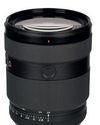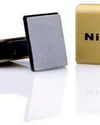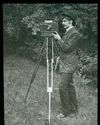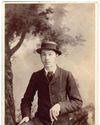
Collectors are often drawn to particular makes, models or types of camera. For some time, I have had a strong interest in, and have carried out a lot of research into, the Wray Optical Company that, for many years, was based at Bromley in Kent. They were principally lens makers, respected the world over for their quality. But they also made a few cameras which, in all honesty, were not so well received.
A bit of background
The Wrayflex was one camera that did gain a modicum of success. Wray made three models in 1951, 1953 and 1959. But, partially due to the quirky designs of the first two, they never really made it up there with the Big Boys. By the time they got the design more on the right track with the third model, the Japanese had arrived to show everyone they could do the job better and cheaper. In the end, across the three Wrayflex models, only a little over 3,000 cameras were ever manufactured. What shouldn't be overlooked, however, is that the Wrayflex was Britain's only really serious attempt at producing a 35mm single-lens reflex. That's why Wrayflexes now appeal to collectors like me, and it's why the cameras, despite a certain unpopularity when they were manufactured and first sold, now command high prices.
But even more intriguing are the cameras Wray tried, and failed, to produce in any significant number before the Wrayflex.
Following World War Two, around 1946, Wray built six prototypes of what would have been Britain's first 35mm camera. They called it the Owl and sent their reps out with samples to gauge feedback from dealers.
The reaction wasn't good and the camera never went into production. Today, for collectors, those six prototypes have become very desirable, rather rare and, when the last one was sold at auction a few years back, extremely expensive. (Don't bother trying to find one. I have two and I know the whereabouts of the other four!)
この記事は Amateur Photographer の February 20, 2024 版に掲載されています。
7 日間の Magzter GOLD 無料トライアルを開始して、何千もの厳選されたプレミアム ストーリー、9,000 以上の雑誌や新聞にアクセスしてください。
すでに購読者です ? サインイン
この記事は Amateur Photographer の February 20, 2024 版に掲載されています。
7 日間の Magzter GOLD 無料トライアルを開始して、何千もの厳選されたプレミアム ストーリー、9,000 以上の雑誌や新聞にアクセスしてください。
すでに購読者です? サインイン

Calling The Shots: A Queer History of Photography
Offering an unprecedented view of photographic history through a queer lens, this is a wonderful and powerful book, says

Large-aperture standard zoom, too
SONY has also revealed a new premium standard zoom, the FE 28-70mm F2 GM.

Super-fast, high-res Sony Alpha Ai II
SONY has announced its new professional full-frame flagship camera, the Alpha A1 II.

39 awesome accessories
Our round-up of the best accessories we've used and reviewed this year, along with some old favourites. There's something here for every budget, starting from just £7, including tripods, bags, filters and much more

Such a thing as society
This autumn sees the launch of a major new book and exhibition devoted to examining the multiplicities of photography during 1980s Britain. Peter Dench finds out more

Join Club
The sociable Canvey Island Photographic Club is keen to grow its in-person meet ups

Capturing flight
Winners and finalists of Bird Photographer of the Year share their tips for success with Hollie Latham Hucker

140 years of change
AP has become the world’s oldest surviving consumer photo magazine because we have moved with the times, says Nigel Atherton

Preserving history in platinum
A deep dive into the meticulous art of platinum printing, and the collaboration between the Royal Geographical Society and Salto Ulbeek. Mike Crawford explores how they brought historical photographs to life with enduring beauty and precision

Life in the past lane
What was life like for an amateur photographer in 1884? John Wade takes a trip back in time